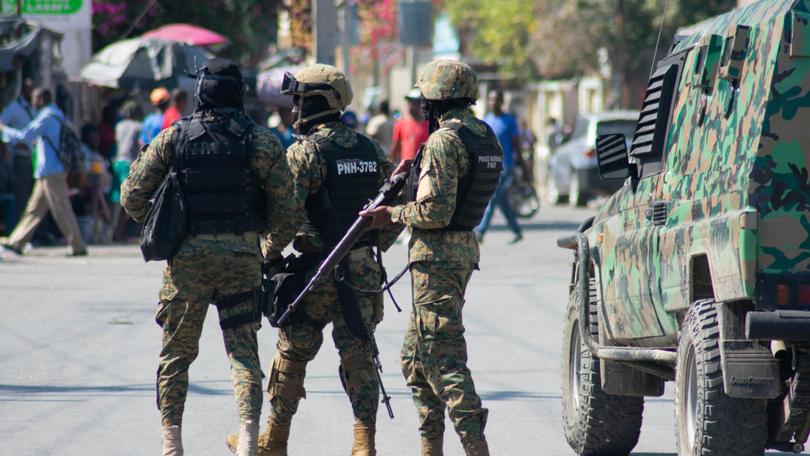US troops flown into Haiti to help evacuate embassy staff as gang chaos grips island nation
US military have been flown in to evacuate embassy staff as gangs take control of the island nation’s besieged capital.

The US military has flown in forces to beef up security at the US Embassy in Haiti and allow nonessential personnel to leave as the island nation’s descent into gang-controlled chaos continues.
The aircraft flew to the embassy compound, the US Southern Command said, meaning that the effort involved helicopters. It was careful to point out that “no Haitians were on board the military aircraft.” That seemed aimed at quashing any speculation that senior government officials might be leaving as the gang attacks in Haiti worsen amid reports that they had seized the country’s only international airport.
The neighbourhood around the embassy in the capital, Port-au-Prince, is largely controlled by gangs, while the nation’s Prime Minister Ariel Henry remains stranded in Puerto Rico.
Sign up to The Nightly's newsletters.
Get the first look at the digital newspaper, curated daily stories and breaking headlines delivered to your inbox.
By continuing you agree to our Terms and Privacy Policy.“This airlift of personnel into and out of the Embassy is consistent with our standard practice for Embassy security augmentation worldwide, and no Haitians were on board the military aircraft,” according to the Southcom statement.
In many cases, nonessential personnel can include the families of diplomats, but the embassy had already ordered departure for nonessential staff and all family members in July. The personnel ferried out of the embassy may have simply been rotating out, to be refreshed by new staff.
The statement Sunday said that the United States remains focused on aiding Haitian police and arranging some kind of U.N.-authorised security deployment. But those efforts have been unsuccessful so far.
Haiti’s embattled prime minister, Mr Henry, travelled recently to Kenya to push for the UN-backed deployment of a police force from the East African country to fight the gangs. But a Kenyan court ruled in January that such a deployment would be unconstitutional.
Mr Henry, who is facing calls to resign or form a transitional council, remains unable to return home. He arrived in Puerto Rico on Tuesday after he was unable to land in the Dominican Republic, which borders Haiti.
On Saturday, the office of Dominican President Luis Abinader issued a statement saying that “Henry is not welcome in the Dominican Republic for safety reasons.” The Dominican Republic, which shares the island of Hispaniola with Haiti, has closed its land border.
“Given the current situation, the presence of the Haitian prime minister in the Dominican Republic is not considered appropriate,” according to the statement, adding that “this decision reflects the firm position of the Dominican government to safeguard its national security and stability.”
The statement described the security situation in Haiti as “totally unsustainable” and said that it “poses a direct threat to the safety and stability of the Dominican Republic.”
The statement predicted “the situation could deteriorate even further if a peacekeeping force is not implemented urgently to restore order.”
Caribbean leaders have called for an emergency meeting Monday in Jamaica on what they called Haiti’s “dire” situation. They have invited the United States, France, Canada, the United Nations and Brazil to the meeting.
Members of the CARICOM regional trade bloc have been trying for months to get political actors in Haiti to agree to form an umbrella transitional unity government.
CARICOM said Friday that while regional leaders remain deeply engaged in trying to bring opposition parties and civil society groups together to form a unity government, “the stakeholders are not yet where they need to be.”
“We are acutely aware of the urgent need for consensus to be reached,” according to the statement. “We have impressed on the respective parties that time is not on their side in agreeing to the way forward. From our reports, the situation on the ground remains dire and is of serious concern to us.”
In February, Mr Henry agreed to hold a general election by mid-2025, and the international community has tried to find some foreign armed force willing to fight gang violence there.
CARICOM has also pushed Mr Henry to announce a power-sharing, consensus government in the meantime, but the prime minister has yet to do so even as Haitian opposition parties and civil society groups are demanding his resignation.
Mr Henry, a neurosurgeon, was appointed as Haiti’s prime minister after the July 2021 assassination of President Jovenel Moise.
It was unclear whether Mr Henry would be in Jamaica for the CARICOM meeting.
In Port-au-Prince, meanwhile, police and palace guards worked Saturday to retake some streets in the capital after gangs launched major attacks on at least three police stations.
Guards from the National Palace accompanied by an armored truck tried to set up a security perimeter around one of the three downtown stations after police fought off an attack by gangs late Friday.
Sporadic gunfire continued Saturday, and one woman writhed in pain on the sidewalk in downtown Port-au-Prince with a gunshot wound after a stray bullet hit her in the leg.
The unrelenting gang attacks have paralysed the country for more than a week and left it with dwindling supplies of basic goods. Haitian officials extended a state of emergency and nightly curfew on Thursday as gangs continued to attack key state institutions.
But average Haitians, many of whom have been forced from their homes by the bloody street fighting, can’t wait. The problem for police in securing government buildings is that many Haitians have streamed into them, seeking refuge.
“We are the ones who pay taxes, and we need to have shelter,” said one woman, who didn’t give her name for safety reasons.
Another Port-au-Prince resident, who also did not give his name, described Friday’s attacks.
“They (the gangs) came with big guns. We have no guns and we cannot defend ourselves. All of us, the children are suffering,” said the man.
